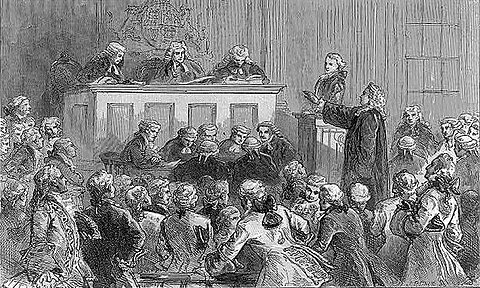Two hundred ninety years ago today, in what would come to be known as a celebrated early example of jury nullification in the New World, a New York jury freed dissident publisher John Peter Zenger from the clutches of a government determined to silence its critics. With British subjugation fresh in their minds, the Framers envisioned the jury as far more than a fact-finding body. They saw it as a critical fortress, a bulwark against government oppression. They had witnessed firsthand the biased verdicts of judges loyal to the Crown, and in response, they enshrined the right to a trial by a jury of one’s peers in the very foundation of the new nation’s legal system.
The Framers understood the jury trial to be a bedrock of criminal adjudication. At the Founding, the function of the criminal jury was not confined to determining guilt. Instead, jury service empowered ordinary citizens to act as a check on the wrongful exercise of state power, preventing the arbitrary or oppressive application of the law. Jurors were the community’s voice, ensuring that the extraordinary power of the state would not be used for tyrannical ends. In fact, the right to a criminal trial by jury is the only right mentioned in both the unamended text of the Constitution and the Bill of Rights, a testament to its profound importance. The Constitution explicitly commands that the trial of “all” federal crimes be by jury, a command underscored by the Sixth Amendment’s declaration that “in all criminal prosecutions” a defendant has the right to a public trial by an impartial jury.
The historical conception of a criminal jury stands in stark contrast to the hollowed-out version jurors are led to believe exists today. When Zenger published pieces critical of New York’s royal governor, William Cosby, he was charged with seditious libel. But his jury exercised a prerogative that criminal jurors still possess today—the power to acquit against the evidence when justice demands.
Whether protecting dissident publishers like Zenger from politically motivated prosecutions or acquitting abolitionists prosecuted for delivering fellow human beings from bondage under the Fugitive Slave Act, jury nullification was employed without controversy before, during, and after the Founding to safeguard victims of an excessively punitive government.
Founding-era jurors were the last line of defense against unjust convictions and punishments. They could blunt the force of immoral laws and arbitrary prosecutions by refusing to subject their neighbors to unjust laws or overtly cruel punishments.
These historical powers and duties included more than just the prerogative to acquit against the evidence. Jurors could ask questions, including what would happen to the defendant if they were to convict, and draw inferences from how those questions were answered or ignored. Additionally, jurors weren’t required to accept the judge’s interpretation of the law, despite being told that they must.
These powers still unquestionably exist today. Yet in a stark and extraordinary shift from past practice, modern criminal jurors are misled to believe that they’re merely fact finders.
Today, prosecutors and judges—often former courtroom advocates for the government—go to considerable lengths to curate the jury pool, ensuring that those who best understand the historic injustice-preventing role of a juror are among the least likely to serve. System actors work tirelessly to shape the perspective of those who do get to serve, all but guaranteeing they won’t say no—no matter how unjust the prosecution or how draconian the sentence.
With a president who has shown a willingness to use the coercive power of the Justice Department to target his adversaries, this historical role of the jury is all the more important. Just as Zenger’s jury defied a tyrannical governor, jurors today can—and should—defy the unjust application of laws that undermine the very premise upon which this nation was founded and tear at the conscience of the community.

